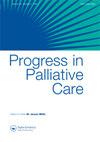Lean in, don’t step back: The views and experiences of patients and carers with severe mental illness and incurable physical conditions on palliative and end of life care
IF 0.8
Q4 PUBLIC, ENVIRONMENTAL & OCCUPATIONAL HEALTH
引用次数: 7
Abstract
Background and Aim: People with severe mental illness (SMI) have a life expectancy of up to twenty years less than the general population and many live with incurable physical health conditions. Yet, they continue to experience barriers when trying to access palliative and end of life care (PEOLC). Little research has been carried out which includes the views and experiences of people with SMI, and this study presents first findings which include people with both SMI and an incurable condition and their carers. It aimed to seek their views, and those of their carers, on their experiences and expectations of accessing PEOLC and to understand how PEOLC for people with SMI could be improved. Methods: Semi-structured interviews were carried out with 8 participants (5 patient participants and 3 carer participants). Thematic analysis of the interview transcripts was undertaken. Findings: Four over-arching themes were developed. (1) Stigma and Prejudice – See Me, Not My Diagnosis (2) Hesitancy and Avoidance – Treading on Eggshells (3) Collaborators in Care – The Ignored Experts and (4) Connections – Leaning in, Not Stepping Back. Significance of Findings: This study presents the first accounts from the UK concerning experiences of PEOLC, barriers to access and how care can be improved, from the perspectives of patients with both a SMI and an incurable physical condition and their carers. The findings illuminate an under-researched area of clinical practice and contribute rich understandings to future service developments and innovations.靠进去,不要后退:患有严重精神疾病和无法治愈的身体状况的患者和护理人员对姑息治疗和临终关怀的看法和经历
背景和目的:严重精神疾病(SMI)患者的预期寿命比一般人群少20年,许多人生活在无法治愈的身体健康状况中。然而,他们在试图获得姑息治疗和临终关怀(PEOLC)时仍然遇到障碍。很少有关于重度精神障碍患者的观点和经历的研究,这项研究首次发现了重度精神障碍患者和不治之症患者以及他们的护理人员。它的目的是寻求他们的意见,以及他们的照顾者,关于他们的经验和期望,并了解如何改善重度精神障碍患者的PEOLC。方法:采用半结构化访谈法对8名参与者(5名患者和3名护理者)进行访谈。对采访笔录进行了专题分析。研究结果:形成了四个总体主题。(1)污名和偏见-看我,而不是我的诊断;(2)犹豫和回避-踩在蛋壳上(3)护理合作者-被忽视的专家;(4)联系-向前一步,而不是后退。研究结果的意义:本研究首次从重度精神分裂症患者和无法治愈的身体状况患者及其护理人员的角度,介绍了英国关于PEOLC的经验、获取障碍和如何改善护理的报道。研究结果阐明了临床实践研究不足的领域,并为未来的服务发展和创新提供了丰富的理解。
本文章由计算机程序翻译,如有差异,请以英文原文为准。
求助全文
约1分钟内获得全文
求助全文
来源期刊

PROGRESS IN PALLIATIVE CARE
PUBLIC, ENVIRONMENTAL & OCCUPATIONAL HEALTH-
CiteScore
2.60
自引率
11.80%
发文量
24
期刊介绍:
Progress in Palliative Care is a peer reviewed, multidisciplinary journal with an international perspective. It provides a central point of reference for all members of the palliative care community: medical consultants, nurses, hospital support teams, home care teams, hospice directors and administrators, pain centre staff, social workers, chaplains, counsellors, information staff, paramedical staff and self-help groups. The emphasis of the journal is on the rapid exchange of information amongst those working in palliative care. Progress in Palliative Care embraces all aspects of the management of the problems of end-stage disease.
 求助内容:
求助内容: 应助结果提醒方式:
应助结果提醒方式:


